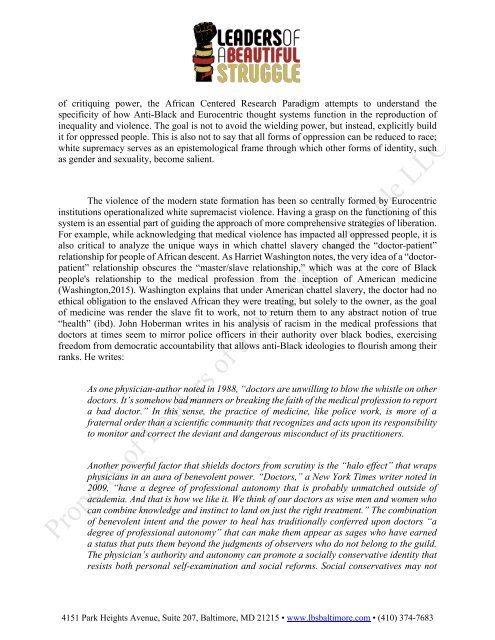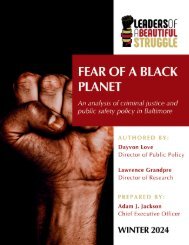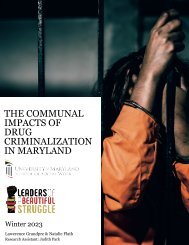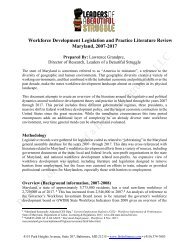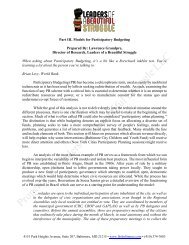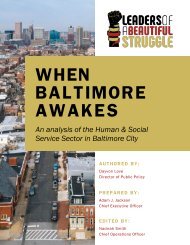Drug Decriminalization in Maryland Through an African Centered Research Paradigm- Analysis and Recommendations
This document offers guidance for theorizing questions related to a proposed research project purposed to advance drug decriminalization in Maryland.
This document offers guidance for theorizing questions related to a proposed research project purposed to advance drug decriminalization in Maryland.
- No tags were found...
Create successful ePaper yourself
Turn your PDF publications into a flip-book with our unique Google optimized e-Paper software.
of critiqu<strong>in</strong>g power, the Afric<strong>an</strong> <strong>Centered</strong> <strong>Research</strong> <strong>Paradigm</strong> attempts to underst<strong>an</strong>d the<br />
specificity of how Anti-Black <strong>an</strong>d Eurocentric thought systems function <strong>in</strong> the reproduction of<br />
<strong>in</strong>equality <strong>an</strong>d violence. The goal is not to avoid the wield<strong>in</strong>g power, but <strong>in</strong>stead, explicitly build<br />
it for oppressed people. This is also not to say that all forms of oppression c<strong>an</strong> be reduced to race;<br />
white supremacy serves as <strong>an</strong> epistemological frame through which other forms of identity, such<br />
as gender <strong>an</strong>d sexuality, become salient.<br />
The violence of the modern state formation has been so centrally formed by Eurocentric<br />
<strong>in</strong>stitutions operationalized white supremacist violence. Hav<strong>in</strong>g a grasp on the function<strong>in</strong>g of this<br />
system is <strong>an</strong> essential part of guid<strong>in</strong>g the approach of more comprehensive strategies of liberation.<br />
For example, while acknowledg<strong>in</strong>g that medical violence has impacted all oppressed people, it is<br />
also critical to <strong>an</strong>alyze the unique ways <strong>in</strong> which chattel slavery ch<strong>an</strong>ged the “doctor-patient”<br />
relationship for people of Afric<strong>an</strong> descent. As Harriet Wash<strong>in</strong>gton notes, the very idea of a “doctorpatient”<br />
relationship obscures the “master/slave relationship,” which was at the core of Black<br />
people's relationship to the medical profession from the <strong>in</strong>ception of Americ<strong>an</strong> medic<strong>in</strong>e<br />
(Wash<strong>in</strong>gton,2015). Wash<strong>in</strong>gton expla<strong>in</strong>s that under Americ<strong>an</strong> chattel slavery, the doctor had no<br />
ethical obligation to the enslaved Afric<strong>an</strong> they were treat<strong>in</strong>g, but solely to the owner, as the goal<br />
of medic<strong>in</strong>e was render the slave fit to work, not to return them to <strong>an</strong>y abstract notion of true<br />
“health” (ibd). John Hoberm<strong>an</strong> writes <strong>in</strong> his <strong>an</strong>alysis of racism <strong>in</strong> the medical professions that<br />
doctors at times seem to mirror police officers <strong>in</strong> their authority over black bodies, exercis<strong>in</strong>g<br />
freedom from democratic accountability that allows <strong>an</strong>ti-Black ideologies to flourish among their<br />
r<strong>an</strong>ks. He writes:<br />
As one physici<strong>an</strong>-author noted <strong>in</strong> 1988, “doctors are unwill<strong>in</strong>g to blow the whistle on other<br />
doctors. It’s somehow bad m<strong>an</strong>ners or break<strong>in</strong>g the faith of the medical profession to report<br />
a bad doctor.” In this sense, the practice of medic<strong>in</strong>e, like police work, is more of a<br />
fraternal order th<strong>an</strong> a scientific community that recognizes <strong>an</strong>d acts upon its responsibility<br />
to monitor <strong>an</strong>d correct the devi<strong>an</strong>t <strong>an</strong>d d<strong>an</strong>gerous misconduct of its practitioners.<br />
Another powerful factor that shields doctors from scrut<strong>in</strong>y is the “halo effect” that wraps<br />
physici<strong>an</strong>s <strong>in</strong> <strong>an</strong> aura of benevolent power. “Doctors,” a New York Times writer noted <strong>in</strong><br />
2009, “have a degree of professional autonomy that is probably unmatched outside of<br />
academia. And that is how we like it. We th<strong>in</strong>k of our doctors as wise men <strong>an</strong>d women who<br />
c<strong>an</strong> comb<strong>in</strong>e knowledge <strong>an</strong>d <strong>in</strong>st<strong>in</strong>ct to l<strong>an</strong>d on just the right treatment.” The comb<strong>in</strong>ation<br />
of benevolent <strong>in</strong>tent <strong>an</strong>d the power to heal has traditionally conferred upon doctors “a<br />
degree of professional autonomy” that c<strong>an</strong> make them appear as sages who have earned<br />
a status that puts them beyond the judgments of observers who do not belong to the guild.<br />
The physici<strong>an</strong>’s authority <strong>an</strong>d autonomy c<strong>an</strong> promote a socially conservative identity that<br />
resists both personal self-exam<strong>in</strong>ation <strong>an</strong>d social reforms. Social conservatives may not<br />
4151 Park Heights Avenue, Suite 207, Baltimore, MD 21215 • www.lbsbaltimore.com • (410) 374-7683


